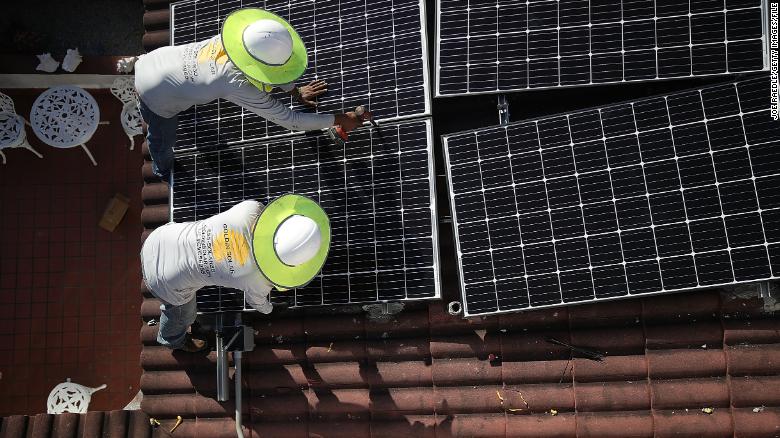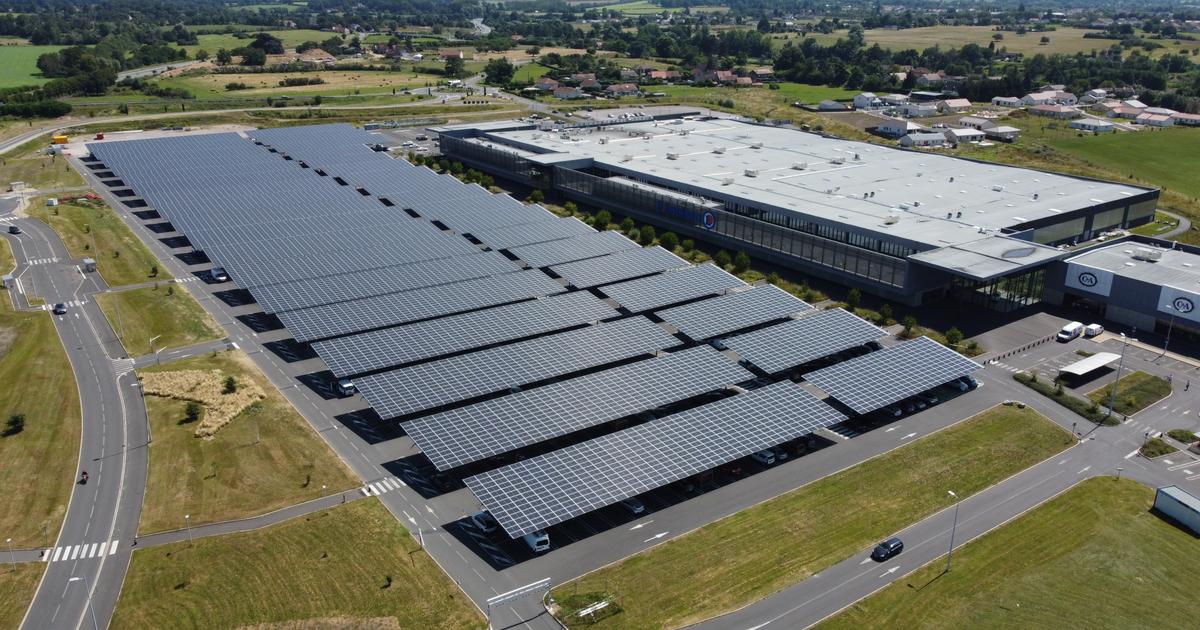To force or not to put solar panels?
2:56
(CNN) --
Steve Rutherford had a unique mission as a Navy SEAL: to help the military harness the power of the sun.
Traces of his work could be seen in Afghanistan as early as 2010. The solar panels he installed converted unrelenting desert lightning into energy that kept bases running even when cut off from diesel lines.
When he retired from the Army in 2011, Rutherford hoped that Florida would be a more attractive climate to install solar panels than war-torn Afghanistan. He started Tampa Bay Solar and, within a decade, grew it into a 30-person operation with plans to expand. But now, the retired commander told CNN that he struggles to make a living.
A bill moving through the state legislature, backed by a powerful utility company, would slash the financial benefits of rooftop solar panels.
Opponents of the legislation, including environmental groups, solar power builders and the state NAACP, say if it passes, a fast-growing green energy industry would shut down overnight, casting a dark cloud over prospects. of solar energy in the so-called Sunshine State.
“It will be crushing for the solar industry,” said Rutherford, who predicted he would have to lay off much of his workforce.
"For 90% of the people who work for me, this will be a significant blow to their pocketbooks."
Policymakers across the country are weighing the future of residential solar power as the sector enters the next phase of its growth.
The promise of energy independence, a cleaner energy source and lower electricity bills has attracted tens of thousands of customers to solar power.
Their rise in popularity has threatened the business model of traditional utilities, which for decades relied on customers who had no alternatives to their neighborhood power company.
Some utilities back down.
They seek to overtake China in solar panel production 0:53
The implications of the fight are keenly felt in Florida, where sunlight is an abundant commodity and residents face an existential crisis over climate change.
Solar industry insiders say the bill Florida lawmakers are considering would make it one of the least welcoming states for residential solar in the country and eliminate thousands of skilled construction jobs.
"It would mean we would have to go out of business here in the state of Florida and move to another state," Stephanie Provost, director of marketing for Vision Solar, told lawmakers at a recent commission hearing.
At the heart of the debate is how much solar-powered households are reimbursed for the excess energy their panels feed back into the grid. It's an arrangement known as net metering, and it's the law in about 40 states. Some customers generate enough power to bring their utility bills down to zero dollars.
Like many states, Florida homeowners are reimbursed at roughly the same rate that electric companies charge their customers, usually in the form of a credit on their monthly bill. Sen. Jennifer Bradley, a Republican representing parts of North Florida, has introduced legislation that could cut that rate by about 75% and open the door for power companies to charge solar customers minimum monthly rates.
Bradley maintained that the existing rate structure, created in 2008, was intended to help boost solar power on Florida's rooftops.
She told a Senate committee that non-solar homes are now subsidizing an industry that is "mature, with many competitors, large public companies, and substantially reduced prices."
World's largest concentrated solar power plant inaugurated
Despite its recent growth, Florida's solar power foothold lags behind many states. Approximately 90,000 homes are solar powered, representing 1% of all electricity customers in the state. Florida ranks 21st in the country for residential solar systems per capita, according to an industry analysis by the Solar Energy Industries Association, the national trade organization for solar builders. By comparison, California, where regulators are also considering utility-backed changes to its net metering policy, has 1.3 million solar-equipped customers.
Advocates of rooftop solar in Florida see a familiar enemy behind the legislation: Florida Power & Light (FPL), the state's largest electric utility and one of the state's most prolific political donors.
A Florida Power & Light lobbyist provided him with a draft version of the bill Bradley introduced on Oct. 18, according to emails first reported by the Miami Herald and provided to CNN by the Energy and Policy Institute, a think tank organization. surveillance that focuses on fossil fuel and utility interests.
Two days later, Florida Power & Light's parent company, NextEra Energy, made a $10,000 donation to Women Building the Future, a political committee affiliated with Bradley, according to state campaign finance records.
The committee received another $10,000 contribution from NextEra in December, those records show.
Trump Tariffs on Solar Panels Would Eliminate Thousands of US Jobs
In a statement emailed to CNN, Bradley did not address political contributions or the utility's involvement in the drafting of the legislation.
He said he introduced the bill because "I think it's good for my constituents and the state."
"Requiring utilities to buy electricity at the same price they sell it is, unsurprisingly, a flawed model that results in solar customers not paying their fair share to support operation and maintenance of the power grid they use and what utilities they are legally required to provide," it said in the statement.
Prior to this year's legislative fight, Florida Power & Light and NextEra donated $3 million to political campaigns and committees. They have hit both parties, but mostly to Republicans and groups aligned with the GOP. Republicans have majority control of the Florida House and Senate. The bill passed a Senate committee earlier this month with a 6-2 vote.
Florida Governor Ron DeSantis, who ran on a promise to "drain the Tallahassee swamp" of special interests, has not publicly taken sides.
DeSantis spokeswoman Christina Pushaw said the governor was aware of the net metering legislation but had no comment.
Florida Power & Light and NextEra have donated a combined $42,000 to DeSantis since he took office, including a $12,000 donation in December, according to state campaign finance records.
The Dutch are masters at taming water.
Climate change is teaching them to let it flood
"Like all legislation, we will be monitoring them as they move through the process," Pushaw said.
Chris McGrath, a spokesman for Florida Power & Light, acknowledged that the company has worked with lawmakers on the legislation, but declined to discuss details about the company's political donations.
NextEra Energy did not respond to a request for comment.
"As every aspect of our business is affected by policy decisions at every level of government, it's important for us to get involved and lead on issues that affect our customers, our employees and our company," said McGrath.
The expansion of solar energy to the middle class
In Florida, where sunlight is plentiful, solar power has been slow to catch on, frustrating environmentalists who see it as a key tool in the battle against climate change.
Wealthy, earth-friendly Floridians once made up the bulk of the solar energy market.
But these days, driving through many Florida neighborhoods is finding solar panels on the sloped roofs of modest, middle-class homes.
Households with incomes under $100,000 now make up about half of the solar market, according to a 2021 U.S. Department of Energy analysis. In Florida, the median income of solar-powered homeowners fell 11% in the last decade.
Falling production costs and increased competition have undoubtedly contributed to this trend.
But advocates say net metering has also made solar energy affordable for the average homeowner.
The starting price of the kits puts solar power out of reach for most single-family homes, averaging $19,000 not including roof upgrades, according to the National Renewable Energy Laboratory.
But homeowners can finance or lease solar panels for 15 to 25 years based on the expected savings on their energy bills from net metering.
The proposed legislation "will cost thousands of Floridians ... their ability to recoup their investment in rooftop solar," said Dave Cullen, president of the Sierra Club Florida.
New solar panels on the ISS 1:01
Jodi James of Melbourne, Florida, told a Senate committee hearing earlier this month that she and her husband retired to Florida and saved for 15 years to outfit their 4,000-square-foot home with solar panels.
They hoped to one day be energy independent and perhaps put money that would have gone into an electricity bill to enjoy their twilight years.
With his fixed income, James worries that lawmakers are taking his investment away.
"I'm scared that the investment we made is suddenly consumed by the fees," James said.
The bill, as written, would allow current solar customers to receive energy credits at the current rate for the next 10 years.
Many solar customers could still see dramatic increases in their electric bill before they've paid off their lease or loan.
Climate crisis: Golf courses live on borrowed time as Earth's weather patterns become more unpredictable
Florida Power & Light says that when solar customers like James receive credits for their energy production, they aren't paying their share of the services the utility provides.
In Florida, utilities must be prepared to serve all customers, including those with solar installations.
It costs power companies money to harden the storm grid, clear power lines, and complete other maintenance, and those costs are passed on to everyone else.
Florida Power & Light says solar customers cost its 5.5 million non-solar customers $30 million a year, or about 50 cents a month, and the amount will nearly triple by 2025 and continue to grow as the popularity of solar energy spreads.
Solar advocates say that figure doesn't take into account the benefits of rooftop solar, such as lower utility demand to build expensive new plants, the costs of which are often passed on to taxpayers.
They also point out that taxpayers have subsidized the fossil fuel industry for decades.
Do you want a vertical garden?
Here we solve all your doubts about the so-called "green walls"
"We believe that anyone should have the right and ability to put solar on their roof if they choose, but we don't believe that everyone should be forced to pay for that decision," said McGrath, the FPL spokesman.
At a committee hearing for the bill, Bradley called net metering a "regressive policy" that benefits the wealthy at the expense of people who can't afford solar.
In an op-ed, Lewis Jennings, chair of environmental and climate justice for the NAACP Florida State Conference, noted that rate increases driven by utility companies, not solar-powered homes, "are felt in poor communities, where too many residents already live without constant access to electricity.
The lesson in Nevada
Florida Power & Light insists that it is part of the green energy revolution.
The company has plans to build 30 million solar panels by the end of the decade.
Images of solar farms and commitments to clean energy are scattered across the website of its parent company, NextEra Energy.
"The world's largest producer of wind and solar power," NextEra declares in large print on its home page.
Six years ago, Florida Power & Light led a campaign to alter the solar landscape through an electoral referendum.
The company and other utilities tried to convince voters that the measure promoted solar energy in Florida, according to campaign finance records.
In fact, it would have created more fees and less competition for solar roof customers. The effort drew national scorn when a political adviser at an industry-affiliated think tank was caught on audio seeming to acknowledge the misleading nature of the campaign, calling it "a bit of political jiu-jitsu." Newspaper editorial boards lined up against him, as did the unions and singer Jimmy Buffet, and the referendum failed.
The lack of certainty in Florida has prevented some of the nation's largest solar companies from entering the state, said Abigail Ross Hopper, president and CEO of the Solar Energy Industries Association.
If more businesses felt comfortable operating here, costs would be further reduced and Florida could become a national leader in rooftop solar, she said.
“As we think nationally about what we need to do to achieve President Biden's goal of being carbon free, the residential solar piece is a critical part of it,” said Ross Hopper.
Bradley told a Senate committee that he doesn't anticipate a slowdown in solar construction in Florida if his bill passes.
She said that hasn't happened in other states where net metering rates have been reconsidered.
A "white gold" rush is coming to the US, but not everyone is thrilled about it
Few states have adopted net metering changes as drastic as those being proposed in Florida, Ross Hopper said, though one tried: Nevada.
Nevada's desert made the state an attractive market for solar companies, and a burgeoning industry for leasing, selling and installing panels on homes was poised to take off.
Then state regulators decided in 2015 to reduce the net metering rate to a percentage of what it was and implemented new rates.
Travis Miller, the owner of the Great Solar Basin who worked for a national company at the time, said the solar industry immediately shut down.
California-based SolarCity cut 550 jobs, blaming the new net metering rate.
Other companies withdrew from the state.
"Most of the local stores went bankrupt and closed their doors," Miller said.
"There was no industry at all."
After two years of public outcry and a lobbying campaign by solar battery maker Tesla, Nevada has changed course.
But the effects of the action in 2015 lingered, Miller said.
Solar builders remained wary of regulators, he said, and investment was slow to take off.
Miller suggested that Florida should tread carefully.
"It created a lot of skepticism and nervousness from consumers," Miller said.
"They thought, 'What if next year they decide to change the rules again?'"
United StatesFloridasolar panels









